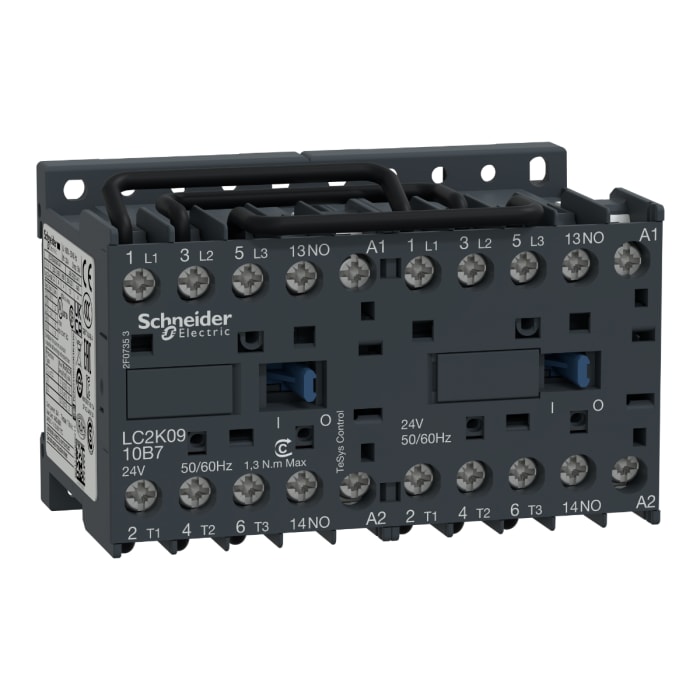Technical Document
Specifications
Brand
Schneider ElectricCoil Voltage
230 V ac
Number of Poles
3
Contact Voltage Rating
690 V ac
Contact Current Rating
9 A
Range
TeSys K
Series
LC2K
Power Rating
4 kW
Function
Reversing
Normal State Configuration
3NO
Number Of Auxiliary Contacts
1
Terminal Type
Screw
Length
58mm
Width
90mm
Depth
57mm
Better World Product (Find out more)
Yes
Better World Verification
Green Premium
Minimum Operating Temperature
-25°C
Maximum Operating Temperature
+50°C
Country of Origin
France
Product details
Schneider Electric LC2K TeSys K Miniature Reversing Contactors
TeSys K Miniature Reversing Contactors from Schneider Electric combine long mechanical and electrical life to offer a high reliable contactor. The range has been designed for integration in control systems and for inductive motor applications. The TeSys K contactors offer quick simple setup while maintaining compliance with international standards. A special armature structure design allows all devices in the range, either AC or DC, to have the same physical size and panel footprint for convenience.
Features and Benefits
• Built-in auxiliary contacts for added switching capability
• Screw connections: IP20 finger-safe terminals with both North American and International terminal markings
• Can be panel mounted with screws or DIN Rail mounted
• Easily installed accessories
• Instantaneous auxiliary contact
• Flexible control circuit to suit a wide range of applications
• High-fault short circuit current ratings provide the flexibility to select any component
What does the utilisation category AC1 and AC3 mean for the TeSys contactors?
Contactor utilisation categories define the current making and breaking values, based on the type of load to be controlled and the operating cycle conditions.
AC-1: This applies to all AC devices with a power factor of at least 0.95. Example of use: resistive load, heating, distribution.
AC-3: This applies to squirrel cage motors where breaking occurs while the motor is running.
Example of use: all squirrel cage motors, lifts, escalators, conveyors, bucket elevators, compressors, pumps, mixers, air conditioning units.
Are the TeSys K contactors suitable for applications in AC4 usage?
The LC2K series is suitable up to a maximum of 440 V ac in category AC4.
Is the TeSys K range a double break pole type contactor?
Yes the TeSys K range uses linear translation movement that provides double breaking of the poles.
What is a reversing contactor?
A reversing contactor is an assembly of two of standard contactors, with a mechanical and electrical interlock connecting them. The interlocks allow only one contactor to be closed (giving power supply to the motor) at any time.

Stock information temporarily unavailable.
Please check again later.
€ 101.47
Each (Exc. VAT)
1
€ 101.47
Each (Exc. VAT)
1

Technical Document
Specifications
Brand
Schneider ElectricCoil Voltage
230 V ac
Number of Poles
3
Contact Voltage Rating
690 V ac
Contact Current Rating
9 A
Range
TeSys K
Series
LC2K
Power Rating
4 kW
Function
Reversing
Normal State Configuration
3NO
Number Of Auxiliary Contacts
1
Terminal Type
Screw
Length
58mm
Width
90mm
Depth
57mm
Better World Product (Find out more)
Yes
Better World Verification
Green Premium
Minimum Operating Temperature
-25°C
Maximum Operating Temperature
+50°C
Country of Origin
France
Product details
Schneider Electric LC2K TeSys K Miniature Reversing Contactors
TeSys K Miniature Reversing Contactors from Schneider Electric combine long mechanical and electrical life to offer a high reliable contactor. The range has been designed for integration in control systems and for inductive motor applications. The TeSys K contactors offer quick simple setup while maintaining compliance with international standards. A special armature structure design allows all devices in the range, either AC or DC, to have the same physical size and panel footprint for convenience.
Features and Benefits
• Built-in auxiliary contacts for added switching capability
• Screw connections: IP20 finger-safe terminals with both North American and International terminal markings
• Can be panel mounted with screws or DIN Rail mounted
• Easily installed accessories
• Instantaneous auxiliary contact
• Flexible control circuit to suit a wide range of applications
• High-fault short circuit current ratings provide the flexibility to select any component
What does the utilisation category AC1 and AC3 mean for the TeSys contactors?
Contactor utilisation categories define the current making and breaking values, based on the type of load to be controlled and the operating cycle conditions.
AC-1: This applies to all AC devices with a power factor of at least 0.95. Example of use: resistive load, heating, distribution.
AC-3: This applies to squirrel cage motors where breaking occurs while the motor is running.
Example of use: all squirrel cage motors, lifts, escalators, conveyors, bucket elevators, compressors, pumps, mixers, air conditioning units.
Are the TeSys K contactors suitable for applications in AC4 usage?
The LC2K series is suitable up to a maximum of 440 V ac in category AC4.
Is the TeSys K range a double break pole type contactor?
Yes the TeSys K range uses linear translation movement that provides double breaking of the poles.
What is a reversing contactor?
A reversing contactor is an assembly of two of standard contactors, with a mechanical and electrical interlock connecting them. The interlocks allow only one contactor to be closed (giving power supply to the motor) at any time.

